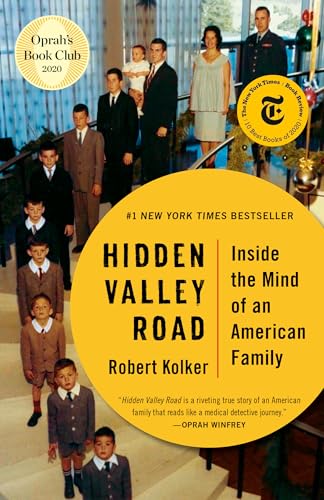Hidden Valley Road: Inside the Mind of an American Family

An Oprah's Book Club pick and #1 New York Times bestseller, Hidden Valley Road is the true medical detective story of an American family who became science's greatest hope in the quest to understand schizophrenia.
BUY THE BOOK
These clubs recently read this book...
Community Reviews
What Bookclubbers are saying about this book
✨ Summarized by Bookclubs AI
Readers say *Hidden Valley Road* is a gripping true story that blends a family’s emotional struggles with schizophrenia and evolving scientific resear...
thenextgoodbook.com
Hidden Valley Road by Robert Kolker
377 pages
What’s it about?
Don and Mimi Galvin are a typical American family raising their children in Colorado in the 1960's and 70's. What is not typical is that they choose to have 12 children, and subsequently 6 of the 12 children are diagnosed with schizophrenia. How does one family cope? Was it nature, nurture, or a combination of both that accounts for this cluster of mental illness? Robert Kolker weaves a story of science, research, and family in this book about the Galvin's.
What did it make me think about?
This book shines a light on how much we don't know about mental illness.
Should I read it?
This was a look at one family's journey thought the mental health system. Robert Kolker does a magnificent job of melding the story of one family dealing with schizophrenia with the study of schizophrenia itself. At the same time I learned a lot about medical research and it's relationship to the pharmaceutical industry. So much to learn from this book. If you are interested in science, research, or mental illness this book (by highlighting one family) tells a fascinating story.
Quote-
"Our relationships can destroy us, but they can change us, too, and restore us, and without us ever seeing it happen, they define us.
We are human because the people around us make us human."
If you liked this try-
The Sixth Extinction by Elizabeth Kolbert
The Splendid Things We Planned by Blake Bailey
An American Summer by Alex Kotlowitz
Ghettoside A True Story of Murder in America by Jill Leovy
Hidden Valley Road by Robert Kolker
377 pages
What’s it about?
Don and Mimi Galvin are a typical American family raising their children in Colorado in the 1960's and 70's. What is not typical is that they choose to have 12 children, and subsequently 6 of the 12 children are diagnosed with schizophrenia. How does one family cope? Was it nature, nurture, or a combination of both that accounts for this cluster of mental illness? Robert Kolker weaves a story of science, research, and family in this book about the Galvin's.
What did it make me think about?
This book shines a light on how much we don't know about mental illness.
Should I read it?
This was a look at one family's journey thought the mental health system. Robert Kolker does a magnificent job of melding the story of one family dealing with schizophrenia with the study of schizophrenia itself. At the same time I learned a lot about medical research and it's relationship to the pharmaceutical industry. So much to learn from this book. If you are interested in science, research, or mental illness this book (by highlighting one family) tells a fascinating story.
Quote-
"Our relationships can destroy us, but they can change us, too, and restore us, and without us ever seeing it happen, they define us.
We are human because the people around us make us human."
If you liked this try-
The Sixth Extinction by Elizabeth Kolbert
The Splendid Things We Planned by Blake Bailey
An American Summer by Alex Kotlowitz
Ghettoside A True Story of Murder in America by Jill Leovy
As a Psycholoy major who has worked with people who suffer from Schizophrenia and Bipolar Disorder I found this book fascinating and sad. Twelve children and ten boys, six of whom were diagnosed and treated for Schizophrenia. And this was during a time when experts didn’t agree on how to help or what was causing this. I actually admired Mimi (the mother) for continuing to try to help her sons, even when she was being blamed for their condition. The author did a great job portraying the stress on the “well” siblings. The chapters dealing with the medical research became more and more detailed until I wasn’t really able to follow them.
Fascinating account of one family who was just decimated by schizophrenia. Don and Mimi Galvin had 12 (!) children and had dreams of raising an all-American family. But 6 of the 12 ended up with schizophrenia, leading to violence, stress, and destruction of the family unit.
The book goes between the heartbreaking chronology of each new case of a brother becoming schizophrenic to descriptions of the studies that have been done in the medical-psychiatric-scientific community to try to understand it, treat it, and hopefully prevent it. There's so much we still don't understand about how the brain works.
The book goes between the heartbreaking chronology of each new case of a brother becoming schizophrenic to descriptions of the studies that have been done in the medical-psychiatric-scientific community to try to understand it, treat it, and hopefully prevent it. There's so much we still don't understand about how the brain works.
Hidden Valley Road mixes the story of a family dealing with mental illness with research being done over time around interventions and pharmaceuticals. It talks quite a bit about the therapy they had and didn't have. It's very well written and easy to digest. There is so much about mental illness that we don't understand but putting more money into research may save us money and people's mental health in the process!
Fantastic view into the current state of mental illness research. Not a very positive trend, but thankful to be able to see it put together so well.
See why thousands of readers are using Bookclubs to stay connected.